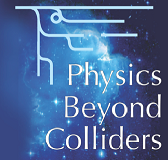Speaker
Description
The search for physics beyond the Standard Model can be performed complementary to high-energy physics by conducting studies at lowest energies. The achieved extraordinary precision is needed for reaching similar or even improved sensitivity limits. Radionuclides provide in this respect an ideal laboratory for addressing properties of all known fundamental interactions. High-precision nuclear physics experiments have allowed for example to set stringent limits on the unitarity of the CKM quark-mixing matrix, on the validity of special relativity and isospin symmetry. Precision measurements of nuclear properties are used to constrain the electric dipole moment in radium-225 or as an essential input for experiments determining the electron neutrino mass in beta-decay and electron-capture processes. Often the interplay between experiment and theory stimulates both the development of theoretical concepts or models and (beyond) state-of-the-art instrumentation. A summary of recent achievements as well as future perspectives in the field of nuclear physics research at ISOLDE and nToF for physics beyond the Standard Model will be presented.
